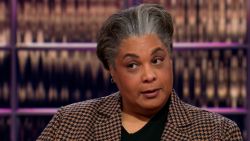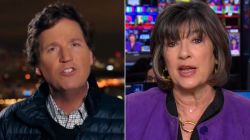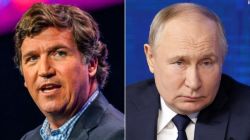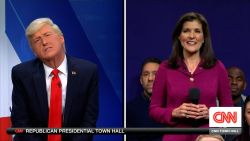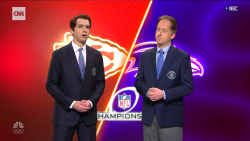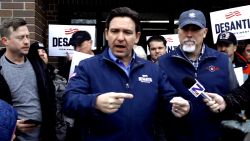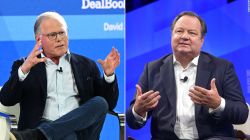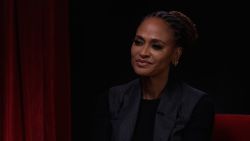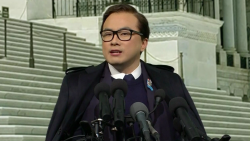BuzzFeed News has a new editor in chief. His first month has been anything but LOL.
Even before his first official day on the job, Mark Schoofs attended an all-hands meeting about furloughs stemming from the pandemic’s economic impact. But Schoofs was ready for a challenge at a media company he already knows well. The Pulitzer Prize winning journalist first joined BuzzFeed in 2014 from ProPublica to lead the investigations team. In 2018, he left to teach at USC Annenberg School of Journalism but returned to replace Ben Smith, who stepped down as editor in chief in January to be the New York Times’ media critic.
Schoofs spoke with CNN Business on his decision to rejoin BuzzFeed and what he hopes to change internally.
This interview has been edited and condensed.
Why did you take the job?
The reason I took the job is really simple. I mean, it’s a great job, but also quite frankly, because of the crisis. The times that you miss being in a newsroom is when there’s a big crisis. I remember on September 11th, for example, all the people were streaming away from the Twin Towers. Like it was like something out of a movie, like a Cecil B. DeMille movie. There were thousands of people who were walking north to walk home away from the burning tower, and I was on my bike in the opposite direction toward the towers. I kind of feel that way now. We’re in the midst of a pandemic and an economic depression. That’s a hell of a story.
What has changed at BuzzFeed since you left? And what have you noticed hasn’t changed?
So what hasn’t changed: It is still a terrific news organization that consistently breaks news on some of the biggest stories of the day. For that, a lot of the credit goes to Ben Smith and to the other people who led the newsroom after he left. And of course the reporters have just done an unbelievably good job of covering the pandemic and now the economic crisis as well. That’s the main thing that hasn’t changed. It’s still a fantastic high powered kinetic news organization.
I think the things that have changed is you’ve seen it to develop into a news organization that knows how to scramble the jets. I remember when I first came to BuzzFeed, it was a very inchoate newsroom that was still developing beats, that was, at that time, developing a breaking news desk. Now it is an organization that when anything breaks, it responds so quickly and if necessary with the entire newsroom and that those muscles are just so much better developed now than they were when I first started.
In what ways do want the newsroom to change, and how do you see yourself operating differently than Ben?
First of all, the thing that Ben was so amazing at was just the dynamism, those sort of the fast twitch muscles. You wanted, as he phrased it, to win the hour. That dynamism is something that I very much hope we can keep up because that is the heart of any newsroom.
I think that I would like to focus on different areas of coverage than maybe Ben had a chance to focus on when he was here. Be a little bit more deliberate in how we coordinate across desks. These stories now are often huge and involve different parts of the world. They involve politics, they involve tech, they involve the economy. If you look at, say the New York Times or The Washington Post, you’ll often see two, three, four, five, seven bylines, one story. There’s a reason they’re doing that because all of those reporters bring expertise and skill and sourcing to that story. We have to get better at our ability to combine forces. We’re a small pirate ship going up against big aircraft carriers. So we have to be able to be super agile, super nimble and collaborate really well.
You’re staying on at USC. How are you able to balance that role with your full-time position as editor in chief?
I think that what’s great about Annenberg and about BuzzFeed is that they both are agile organizations that are able to see the potential benefits of an unprecedented collaboration. So yes, running BuzzFeed News is a full-time job, but I do believe it is perfectly possible for me and the CEO of BuzzFeed, Jonah Peretti, to each teach a course a year. I think it’s something that is not available to any other news organization. You have the ability of a sitting CEO and an editor in chief to bring students in, immerse them in the actual newsroom, challenge them with real world journalism and real world problems that the news industry faces and that kind of actual apprenticeship and mentorship is incredibly powerful. That’s what the students will I hope gain from the courses that Jonah and I will teach.
You’re based in Los Angeles while a big part of your reporting team is based in New York. How do you plan on leading from the West Coast when so many people are on the East Coast?
I think we’re all leading from our houses now. I’m not sure that at the end of this epidemic we’re going to go back to the same kind of offices that we had before.
I think that many people are realizing two things and they’re contradictory things. One, that they like working from home and then in some ways they’re more productive working from home, and two, that they missed the social aspects of work that came about by everybody being in the same place. The way that people will work is not going to be the way it was before. I would venture to guess that there will still be a large work from home component. I think Zoom is just a permanent part of our lives now. I think managing remotely is something that literally every single person in every single industry except maybe those who are dealing only with essential workers are doing. I think in a strange way, this time is preparing the template for how one can manage a global team largely remotely.
When one can travel, again, I plan to travel. When we have an office again, I plan to go to places where we have an office or if we don’t have an office where we have a substantial number of people and meet them in person and do actual face-to-face off-sites or what have you because I do think that there is a value in actually being able to see people and not just see their square on a screen. It’s a hybrid answer, but I suspect we’re going to end up with a hybrid culture.
You’re taking over BuzzFeed during a delicate time in our industry. How are you keeping up morale among employees?
Number one and most important, I promised them that I will be honest, that I will be candid and I will not sugarcoat. If there’s a question I cannot answer, I will tell them that I cannot answer. If there’s a question that I don’t know the answer to, I will tell them that I don’t know and try to find it out. But if there is information that I have and can share, I will share it and I will share it in a direct way without sugarcoating. In a time of crisis, I think people need that, and ultimately, I think people respect that even if what you’re saying is really awful.
I think if you level with people, if you share financial information, we’ve shared more financial information with the news team that has ever been shared with the news team before, so that we’re being transparent or explaining why we’re taking the actions we’re taking. Most importantly, when we came to the union, we said, “Listen, we’d like to make work-share work. This is how far we’ve got. Let us show you the work that we’ve done and then let’s take it from there and see if working together, we can find a way to make that work and save some jobs while also reaching the cost savings that we need to reach.”
(A day after this interview, BuzzFeed News union and management agreed on a work-share program.)
The third way to keep up morale is to focus on the work. Everybody who’s in this job is in it because they love journalism.
Why are you starting an Inequality desk?
Inequality has been a major issue in American life and a growing issue in American life over a long period of time, and now COVID-19 has made those rifts in our society deeper and also made them more neon. Everybody is aware of these problems. They’re aware that if you are an “essential worker” that often you’re treated as a disposable worker. Everybody is aware that there is a great gap in who’s getting and dying from COVID-19 both in terms of economics and in terms of race, which is obviously a bright red thread that runs through American history. We’re facing an economic depression in which almost a quarter of Americans have lost their jobs, and that is going to lead to a very acute awareness of the haves and the have-nots and the way in which our society for better and for worse is structured.
What do you think of Ben Smith’s work at the Times?
I never read Ben Smith’s columns ever. [laughs] Ben always has an interesting and provocative point of view. So of course I read his column every Sunday.
Any favorites so far?
I would say that the one on unions was really interesting. I want to be careful here because I don’t want anybody in a union -— ours or any other union — to misconstrue what I’m saying. His point was that unions are kind of fighting for scraps. There are a lot of companies, media companies and news companies, that are financially strapped and a part of the reason that they’re financially strapped is that the big platforms have taken a lot of the advertising and have not given nearly as much back as they’ve taken. Now they have made some steps in the right direction and I want to praise the platforms for having made those steps, but it’s still not nearly enough.
It made me think about one of the larger missions that I have, which is to make sure that BuzzFeed as a company and BuzzFeed News as a division is as financially sound as it possibly can be so that we never ever have to go through a period of furloughing again and that we can make sure that all of our great journalists continue to have great jobs. Honestly, these days I think about that at least as much as I think about anything else and probably more.



